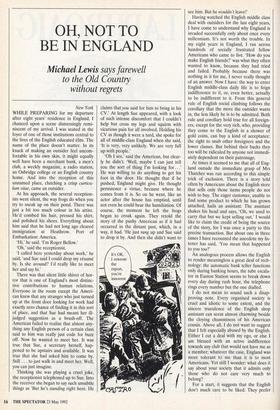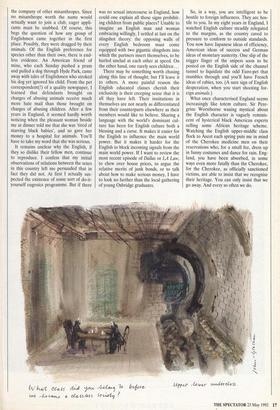OH, NOT TO BE IN ENGLAND
Michael Lewis says farewell
to the Old Country without regrets
New York WHILE PREPARING for my departure after eight years' residence in England, I chanced upon a scene distressingly remi- niscent of my arrival. I was seated in the foyer of one of those institutions central to the lives of the English educated elite. The name of the place doesn't matter. In its knack of making an outsider feel uncom- fortable in his own skin, it might equally well have been a merchant bank, a men's club, a weekly magazine, a radio station, an Oxbridge college or an English country home. And into the reception of this unnamed place, clutching a crisp curricu- lum vitae, came an outsider.
At his approach, the several reception- ists went silent, the way frogs do when you try to sneak up on their pond. There was just a bit too much colour in his attire. He'd combed his hair, pressed his shirt, and polished his shoes. Everything about him said that he had not long ago cleared immigration at Heathrow. Port of Embarkation: America.
'Hi,' he said. 'I'm Roger Bellow.'
'Oh,' said the receptionist.
'I called here yesterday about work,' he said, 'and Sue said I could drop my resume by. Is she around? I'd really like to meet her and say hi.'
There was that silent little shiver of hor- ror that is one of England's most distinc- tive contributions to human relations. Everyone in the room except the Ameri- can knew that any stranger who just turned up at the front door looking for work had exactly zero chance of finding it in this sort of place, and that Sue had meant her ill- judged suggestion as a brush-off. The American failed to realise that almost any- thing any English person of a certain class said to him was really just code for buzz off. Now he wanted to meet her. It was true that Sue, a secretary herself, hap- pened to be upstairs and available. It was true that she had asked him to come by. Still . . . to just walk in and meet her. Well, you can just imagine.
Thinking she was playing a cruel joke, the receptionist telephoned up to Sue. Into the receiver she began to say such unsubtle things as 'But he's standing right here. He claims that you said for him to bring in his CV.' At length Sue appeared, with a look of such intense discomfort that I couldn't help but cross my legs and squirm with vicarious pain for all involved. Holding his CV as though it were a turd, she spoke for all of middle-class England when she said, 'It is very, very unlikely. We are very full up with people.'
'Oh I see,' said the American, but clear- ly he didn't. 'Well, maybe I can just tell you the sort of thing I'm looking for ...' He was willing to do anything to get his foot in the door. He thought that if he pushed, England might give. He thought persistence a virtue, because where he comes from it is. So on he went, like an actor after the house has emptied, until not even he could bear the humiliation. Of course, the moment he left the frogs began to croak again. They retold the story of the pushy American as if it had occurred in the distant past, which, in a way, it had. 'He just rang up and Sue said to drop it by. And then she didn't want to see him. But he wouldn't leave!'
Having watched the English middle class deal with outsiders for the last eight years, I have come to understand why England is invaded successfully only about once every millennium. It's not worth the trouble. In my eight years in England, I ran across hundreds of socially frustrated fellow Americans who came to live. 'How do you make English friends?' was what they often wanted to know, because they had tried and failed. Probably because there was nothing in it for me, I never really thought of an answer. Now I have: the way to enter English middle-class daily life is to feign indifference to it, or, even better, actually to be indifferent to it. From this general rule of English social climbing follows the corollary that the more the outsider wants in, the less likely he is to be admitted. Both rule and corollary hold true for all foreign- ers, except for the very rich, who, providing they come to the English in a shower of gold coins, can buy a kind of acceptance: the right to snub other foreigners and the lower classes. But behind their backs they too will be ridiculed by anyone not immedi- ately dependent on their patronage.
At times it seemed to me that all of Eng- land outside the immediate grasp of Mrs Thatcher was run according to this simple trick of exclusion. There is a story told often by Americans about the English store that sells only those items people do not wish to buy. The eager customer, unable to find some product to which he has grown attached, hails an assistant. The assistant shakes his head and says, 'Oh, we used to carry that but we kept selling out.' I would like to claim the credit of being the source of the story, for I was once a party to this precise transaction. But about one in three times I have recounted the anecdote my lis- tener has said, 'You mean that happened to you too?'
An analogous process allows the English to render meaningless a great deal of tech- nology: the automatic bank teller functions only during banking hours, the tube escala- tor in Euston Station seems to break down every day during rush hour, the telephone rings every number but the one dialled.
I do not mean to sound such a disap- proving note. Every organised society is cruel and idiotic to some extent, and the sincere truculence of the English shop assistant can seem almost charming beside the cloying chumminess of his American cousin. Above all, I do not want to suggest that I felt especially abused by the English.
Either I cut a deal with my ego, or else I am blessed with an active indifference towards any club that would not have me as a member; whatever the case, England was more tolerant to me than it is to most Americans. Yet still I wonder: what does it say about your society that it admits only those who do not care very much to belong?
For a start, it suggests that the English don't much care to be liked. They prefer the company of other misanthropes. Since no misanthrope worth the name would actually want to join a club, eager appli- cants must be snubbed. Of course, this begs the question of how any group of Englishmen came together in the first place. Possibly, they were dragged by their animals. Of the English preference for species other than their own, there is end- less evidence. An American friend of mine, who each Sunday pushed a pram and pulled a dog through Hyde Park, came away with tales of Englishmen who stroked his dog yet ignored his child. From the pet correspondent(!) of a quality newspaper, I learned that defendants brought on charges of abusing animals receive much more hate mail than those brought on charges of abusing children. After a few years in England, it seemed hardly worth noticing when the pleasant woman beside me at dinner told me that she was 'tired of starving black babies', and so gave her money to a hospital for animals. You'll have to take my word that she was serious.
It remains unclear why the English, if they so dislike their fellow men, continue to reproduce. I confess that my initial observations of relations between the sexes in this country left me persuaded that in fact they did not. At first I actually sus- pected the existence of some sort of do-it- yourself eugenics programme. But if there
was no sexual intercourse in England, how could one explain all those signs prohibit- ing children from public places? Unable to imagine an English man and woman embracing willingly, I settled at last on the slingshot theory: the opposing walls of every English bedroom must come equipped with two gigantic slingshots into which the partners insert themselves, to be hurled unclad at each other at speed. On the other hand, one rarely sees children ...
There may be something worth chasing along this line of thought; but I'll leave it to others. A more painful reason the English educated classes cherish their exclusivity is their creeping sense that it is all they have left. Their institutions in themselves are not nearly as differentiated from their counterparts elsewhere as their members would like to believe. Sharing a language with the world's dominant cul- ture has been for English culture both a blessing and a curse. It makes it easier for the English to influence the main world power. But it makes it harder for the English to block incoming signals from the main world power. If I want to review the most recent episode of Dallas or LA Law, to chew over house prices, to argue the relative merits of junk bonds, or to talk about how to make serious money, I have to look no further than the local gathering of young Oxbridge graduates. So, in a way, you are intelligent to be hostile to foreign influences. They are hos- tile to you. In my eight years in England, I watched English culture steadily relegated to the margins, as the country caved to pressure to conform to outside standards. You now have Japanese ideas of efficiency, American ideas of success and German ideas of monetary austerity. One slip of the trigger finger of the snipers soon to be posted on the English side of the channel tunnel to liquidate the odd Euro-pet that stumbles through and you'll have French ideas of rabies, too. (A sure sign of English desperation, when you start shooting for- eign animals.) What once characterised England seems increasingly like totem culture. Sir Pere- grine Worsthorne waxing mystical about the English character is vaguely reminis- cent of hysterical black American experts selling some African heritage scheme. Watching the English upper-middle class flock to Ascot each spring puts me in mind of the Cherokee medicine men on their reservations who, for a small fee, dress up in funny costumes and dance for rain. Eng- land, you have been absorbed, in some ways even more fatally than the Cherokee, for the Cherokee, as officially sanctioned victims, are able to insist that we recognise their heritage. You can only insist that we go away. And every so often we do.



































































 Previous page
Previous page